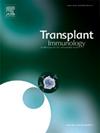移植排斥反应与免疫细胞间因果关系的探索:一项双样本孟德尔随机化研究
IF 1.4
4区 医学
Q4 IMMUNOLOGY
引用次数: 0
摘要
移植后排斥反应是器官移植患者面临的一个严重问题。目前认为免疫相关因素是移植排斥反应的主要原因,但许多免疫细胞表型的作用尚不清楚。我们使用孟德尔随机化分析来探讨731免疫细胞与移植排斥风险之间的关系。我们系统地分析了3657名欧洲人外周血中的731种免疫细胞表型(包括绝对计数、表面标记物和功能状态)。在全基因组显著性阈值(p < 1 × 10−5)下选择遗传工具来评估与FinnGen生物银行移植排斥事件的双向因果关系(n = 16,380,395个snp)。前瞻性磁共振分析确定了33种与排斥风险显著相关的免疫表型:19种保护性表型(优势比[OR] <; 1, p < 0.05),主要发生在B细胞亚群中,14种风险增强表型(OR > 1)。反向MR显示,排斥事件导致34种免疫表型改变,18种效应表型上调,16种调节性表型下调。敏感性分析证实了对多效性的稳健性(MR-Egger截距p >; 0.05, MR-PRESSO全局检验p >; 0.01,异质性检验p >; 0.05)。这些发现强调了B细胞可塑性和Treg耗竭在移植结果中的动态相互作用,提出了预防排斥反应的新治疗靶点。我们的研究证实了移植排斥反应与免疫细胞之间的密切关系,特别是某些B细胞亚群与移植排斥反应风险较低有因果关系,为未来的临床治疗提供了新的靶点和见解。本文章由计算机程序翻译,如有差异,请以英文原文为准。
Exploration of causal relationship between transplant rejection and immune cells: A two-sample Mendelian randomization study
Post-transplant rejection is a serious problem for patients undergoing organ transplantation. It is currently believed that immune-related factors are the main causes of transplant rejection, but the roles of many immune cell phenotypes are still unclear.
We utilized Mendelian randomization analysis to explore the association between 731 immune cell and the risk of transplant rejection.
We systematically analyzed 731 immune cell phenotypes (including absolute counts, surface markers, and functional states) from peripheral blood of 3657 European individuals. Genetic instruments were selected at a genome-wide significance threshold (p < 1 × 10−5) to assess bidirectional causal relationships with transplant rejection events from FinnGen biobank (n = 16,380,395 SNPs). Forward MR analysis identified 33 immune phenotypes significantly associated with rejection risk: 19 protective (odds ratio [OR] < 1, p < 0.05) predominantly in B cell subsets, and 14 risk-enhancing phenotypes (OR > 1). Reverse MR revealed that rejection events causally altered 34 immune phenotypes, upregulated 18 effector phenotypes and downregulated 16 regulatory phenotypes. Sensitivity analyses confirmed robustness against pleiotropy (MR-Egger intercept p > 0.05, MR-PRESSO global test p > 0.01 and heterogeneity test p > 0.05). These findings highlight the dynamic interplay between B cell plasticity and Treg depletion in transplant outcomes, suggesting novel therapeutic targets for rejection prevention.
Our research confirms the close relationship between transplant rejection and immune cells, especially that certain B cell subsets are causally linked to a lower risk of transplant rejection, providing new targets and insights for future clinical treatments.
求助全文
通过发布文献求助,成功后即可免费获取论文全文。
去求助
来源期刊

Transplant immunology
医学-免疫学
CiteScore
2.10
自引率
13.30%
发文量
198
审稿时长
48 days
期刊介绍:
Transplant Immunology will publish up-to-date information on all aspects of the broad field it encompasses. The journal will be directed at (basic) scientists, tissue typers, transplant physicians and surgeons, and research and data on all immunological aspects of organ-, tissue- and (haematopoietic) stem cell transplantation are of potential interest to the readers of Transplant Immunology. Original papers, Review articles and Hypotheses will be considered for publication and submitted manuscripts will be rapidly peer-reviewed and published. They will be judged on the basis of scientific merit, originality, timeliness and quality.
 求助内容:
求助内容: 应助结果提醒方式:
应助结果提醒方式:


